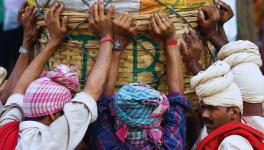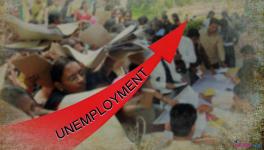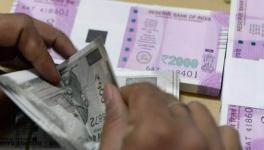Tourism Picks up, but Small Players Left in the Lurch
Representational use only.Image Courtesy: Flickr
It is November with its usual hustle and bustle around the ghats of Varanasi occupied with tourists after two years of a grinding halt. "Everyone is trying to earn as much as they can because when tourists leave the city after the season, we have to depend on our earnings until the next season starts,” said Lallu Manjhi, a Navik Mazdoor from Assi Ghat.
October to March is the peak tourist season in India as favourable weather and temperature make it ideal for sightseeing and other tourist activities.
Big Business owners in the tourism sector, be it restaurants, hotels, guest houses, or travel agencies, make enough profits during the peak season to easily manage the off-season. However, that is not the case for small businesses and workers.
Seasonality is the biggest factor that impacts tourism businesses in terms of retaining staff year-round and reducing economic productivity.
Tourism is in full swing in the Southwestern coastal state of Goa. Foreigners are back once again, and they are a good source of income for businesses. Anil, a private cook for foreigners at a villa near Candolim beach, explained to NewsClick, “Goa is nothing without foreigners. I charge Rs 2500 per day, but after March, when tourists are less, I can charge only Rs 1500. During June and monsoons, when tourists are almost nill, I return to my hometown Delhi and wait for the next season to start.”
A guest house manager from Varanasi, Suresh Khanna (name changed), told NewsClick, “Last April to September, most of the rooms were vacant, and the situation was the same in other guest houses. Now, tourism is gathering momentum, but small guest houses like ours can't charge beyond 400 to 500 rupees a day as most of my guests are low-income workers from European countries and Indian pilgrims. We are not the brand hotels that get most of the elite tourists and charge high, so we are left with no other option except to cut our staff's salary during the off-season. Every year, we hire some new staff because if they find jobs in other sectors, they don't return.”
Obtaining loans for small businesses is another issue for many. "It is not always possible for small businesses to provide collateral to get the banks to have faith in them,” said Deepu Sahani, who wants to start a coffee and beverage shop near Pandey ghat in Varanasi. “I also applied for MUDRA Loan under Pradhan Mantri Mudra Yojana (PMMY) but to no avail,” he lamented while speaking to NewsClick.
One can find small restaurants and eateries in the narrow lanes of Banaras; these serve both foreign and Indian tourists and are all elated and enthusiastic with the returning flow of tourists. However, many of these eateries do not have permanent salaried employees because of a lack of steady profit.
They keep workers who are paid on a ‘per-day’ basis, and as soon as the tourism season nears its end and tourists return towards the mountains, these workers are once again unemployable.
The tourism Industry is not a level playing field for everyone. Take the example of boat riding in Varanasi, which is very famous among tourists; the maximum profit goes to big owners who have multiple boats and also houseboats. During festivals like Dev Diwali, these owners can earn lakhs in a single day. Further, due to the advent of online booking, they get more clients and high-paying ones too. On the other hand, the earnings of small boatmen and Navik Mazdoors (who don't own any boat) are very less. Many Navik Mazdoors resort to labour work and auto driving during summer when tourists are significantly fewer.
In Bodhgaya (where Gautam Buddha is said to have attained enlightenment), tourism is witnessing revival, with the return of groups from Thailand, Sri lanka and other Buddhist countries.
Monu Sharma, a tourist guide from Bodhgaya, said, “Last two years were very difficult, now we are getting employment, but our real concern is regular work and timely payment, which has not been resolved yet. Referring to the seasonal nature of work, Sharma further added, "This is our fate, we can't escape it. Like developed countries, our country doesn't have social security schemes to take care of its citizens. Every business has been impacted by the global pandemic, but we are the worst hit.”
While the entire tourism industry works on an advance payment system, tourist guides are paid after the service is delivered. This makes them dependent on tour companies and hotels for payments, which are at times delayed. “We are ill-paid and not paid upfront. We beg for our payments after every season,” Sharma added.
Even during the peak season, guides do not get to work properly due to demand and supply mismatch. “Due to the lack of efforts by the government to promote India in overseas markets, fewer foreign tourist arrivals happen despite India's rich and diverse culture. In some of the tourist offices that India has in different regions across the globe, there are no senior-level representatives or heads to actively promote the country," said Ravi Kumar, a Delhi-based guide
Another tourist guide (name withheld at his request) from Varanasi told NewsClick, "Big businesses don't have much to worry about since their profit margin is huge. The real challenge is for the smaller ones due to which many of the employees working there get exploited in terms of low wages. Since people don't have other better options because of high unemployment, they don't raise their voices.”
Pandey Ji, a priest at Panchganga ghat in Varanasi, talked about “how the online system is creating a kind of monopoly.” He said, “Earlier pilgrims directly used to contact us for performing rituals and Puja. Now pilgrims can book their priest and place of worship in advance through travel agencies, which is only benefitting a few with lots of work and we are sitting idle at ghats with no work.”
It seems that workers in the tourism industry don’t find such a profit to be attracted by it. It is only beneficial and lucrative for those who have capital, and small businesses and workers are barely able to make ends meet.
Get the latest reports & analysis with people's perspective on Protests, movements & deep analytical videos, discussions of the current affairs in your Telegram app. Subscribe to NewsClick's Telegram channel & get Real-Time updates on stories, as they get published on our website.
























